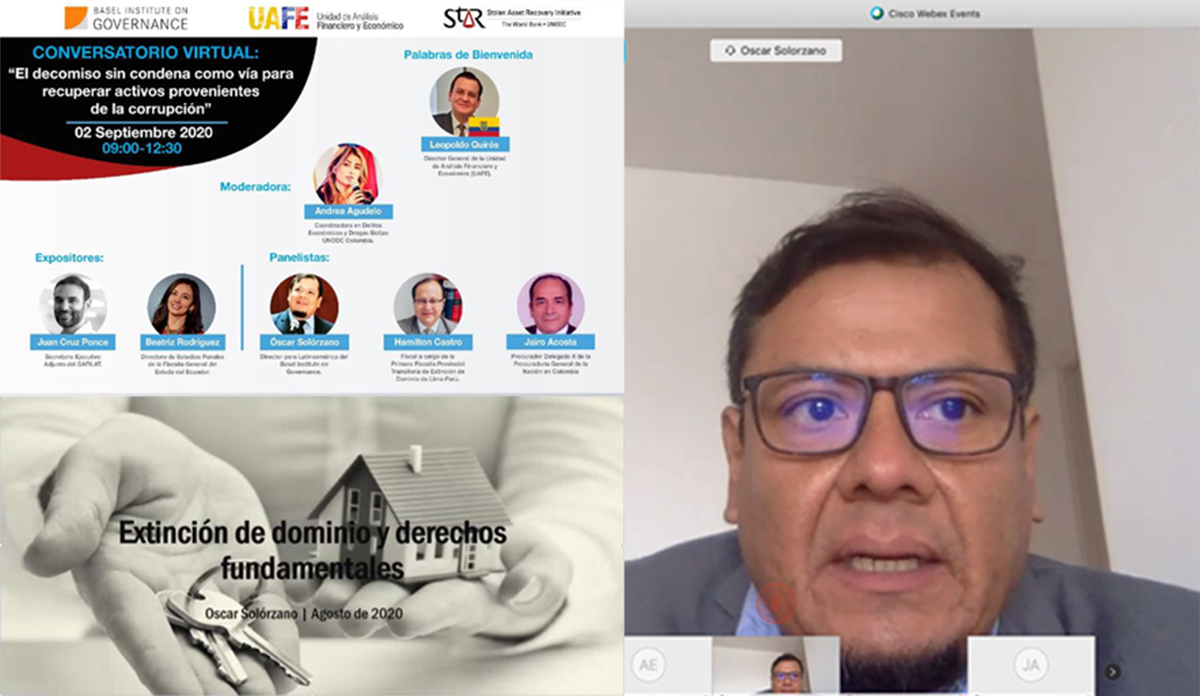Debating non-conviction-based confiscation legislation for asset recovery in Ecuador

Oscar Solórzano participated in a virtual discussion with Ecuadorian legislators and other leading asset recovery experts from across Latin America on 2 September. The topic: Non-conviction-based confiscation legislation as a tool to recover assets arising from corruption.
The high-level panel revolved around the importance of a draft asset recovery law in Ecuador (Ley Orgánica de Recuperación de Activos y Bienes de Origen y Destino Ilícito e Injustificado) in the context of the fight against organised crime, corruption and other financial crimes. There is a need to incorporate provisions for non-conviction-based confiscation (NCBC, or decomiso sin condena in Spanish) in Ecuadorian law as part of the asset recovery toolkit available to prosecutors.
The event was organised by the Unidad de Análisis Financiero y Económico (Financial and Economic Analysis Unit, or UAFE) with the support of the Basel Institute on Governance and Stolen Asset Recovery Initiative (StAR) of the World Bank and UNODC. Technical inputs to the debate came from different perspectives, including the Ecuadorian Office of the Public Prosecutor, the Financial Action Task Force (FATF), and international experiences from Colombia and Peru.
NCBC laws are both powerful and constitutional
Oscar Solórzano opened his presentation by pointing to the fact that most money stolen through corruption is never recovered by the victim states. This, he said, is partly because the confiscation of assets is often linked in national laws to a criminal conviction. No conviction means no confiscation and therefore no chance to recover the stolen assets.
The result: in too many cases, crime does pay.
The rise in the adoption of NCBC mechanisms in Latin America in particular is based on the premise that those who break the law should not benefit financially from their crimes.
NCBC laws are aimed at proving that the assets were illegally obtained and not at proving the guilt of an individual. This is necessary because in many cases of corruption where NCBC is applicable, the individual is dead or has absconded and cannot therefore be prosecuted for a criminal offence.
Solórzano went on to explore the intersection between NCBC legislation and fundamental human rights, such as the right to property, the presumption of innocence and the right to a fair trial. He provided both legal/technical arguments and experiences from Peru and Colombia, where NCBC legislation known as extinción de dominio has achieved a balance between criminal policy imperatives and the protection of fundamental rights.
Promoting NCBC legislation in Latin America
Led by Solórzano, the International Centre for Asset Recovery (ICAR) team in Peru has been at the forefront of innovation in international asset recovery efforts.
Peru's recently enacted non-conviction-based confiscation legislation, known as extinción de domino, is currently being rolled out across a system of specialised courts and chambers. It is already being tested in a landmark case led by Specialised Prosecutor Hamilton Castro, who also spoke at the virtual conversation.
In July 2020, the Basel Institute on Governance signed a framework agreement with Peru’s Special Public Prosecutor’s Office to provide technical assistance and training in support of asset recovery, with a focus on supporting use of the country’s extinción de dominio legislation. This builds on our existing long-standing engagement with the country’s Attorney General's Office and Financial Intelligence Unit.
ICAR has been providing technical assistance and training to Ecuador’s Attorney General’s Office and UAFE on high-level cases of corruption and money laundering since 2018.
More information and participants
The high-level panel was opened by UAFE Director General Leopoldo Quirós and moderated by Andrea Agudelo, Coordinator for Economic Crimes and Illicit Drugs at UNODC Colombia. Juan Cruz Ponce, Adjunct Executive Secretary at GAFILAT (the FATF's regional branch) and Beatriz Rodríguez, Director of Criminal Studies at the Ecuadorian Attorney General's Office, gave presentations. Jairo Acosta, Procurador Delegado of the Colombian Special Public Prosecutor’s Office, joined Oscar Solórzano and Hamilton Castro on the panel.
For more information on NCBC confiscation, see these notes from the ICAR-organised side event of the Conference of the States Parties to the UNCAC in Abu Dhabi last year, as well as in Oscar Solórzano’s speech at that event.
To understand the practical implications, read this interview with Peruvian Specialised Prosecutor Hamilton Castro: Landmark asset recovery case puts Peruvian non-conviction-based confiscation legislation to the test (also in Spanish).



